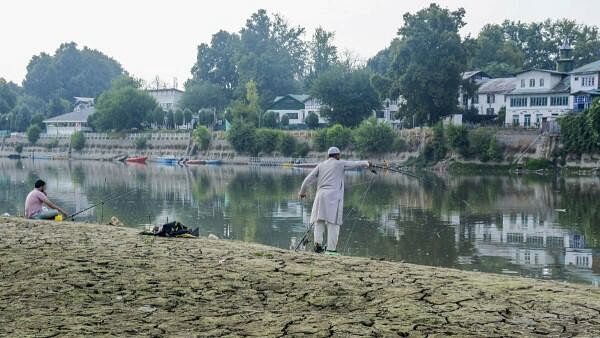
People fish at River Jhelum, partially dried due to a long spell of dry weather and heatwave conditions, in Srinagar
Credit: PTI Photo
Srinagar: The Kashmir Valley, renowned for its serene lakes, pristine streams, and aquatic life is facing an alarming threat as an intense heat wave continues to grip the region.
Experts warn that the soaring temperatures are jeopardizing the delicate aquatic ecosystems that are vital to the local biodiversity and economy. Kashmir is grappling with a rare heat wave triggered by day temperatures that run six degrees Celsius above the normal mark.
Fish are highly sensitive to changes in water temperature and even slight increases can affect their metabolism, growth, and reproductive cycles, experts said. The heat wave is causing water levels to drop and oxygen levels to decrease, creating a hostile environment for fish and other aquatic species.
Shaheena Jan, an environmental researcher, highlighted the severity of the situation. “The current heat wave is unprecedented in its intensity and duration. Our lakes and streams are experiencing elevated water temperatures, which is causing significant stress to aquatic life,” she explained.
If these conditions persist, we could see a decline in fish populations, which will have a ripple effect on the entire ecosystem, she said. The Dal Lake, a famous tourist attraction and a critical water body in Srinagar, has seen its surface temperature rise dramatically over the past few weeks.
“The increase in water temperature is leading to decreased oxygen levels, which can be fatal for fish and other aquatic organisms,” Jan warned.
Dr Mehraj Bashir, an ichthyologist said in the past, fish have died in water bodies like Dal Lake and the Jhelum River due to various factors.
“Water temperature up to 25 degree Celsius is manageable. Beyond this, fish start to struggle, although they can tolerate up to 30 degree Celsius. As temperature increases, oxygen consumption also increases. A water oxygen concentration of 10-15 mg/L is ideal,” he said.
The streams and rivers, which are fed by the melting snow from the mountains, are also experiencing the brunt of the heat wave. The accelerated snowmelt, combined with the high temperatures, is altering the flow patterns and reducing the water quality.
Local fishermen, who rely on the lake for their livelihood, have already reported a noticeable drop in their daily catch. Ghulam Nabi, a fisherman, shared his concerns. “We’ve never seen such warm waters in the lake. The fish are either moving to deeper, cooler parts or dying off. This is our main source of income, and it's becoming harder to sustain our families."